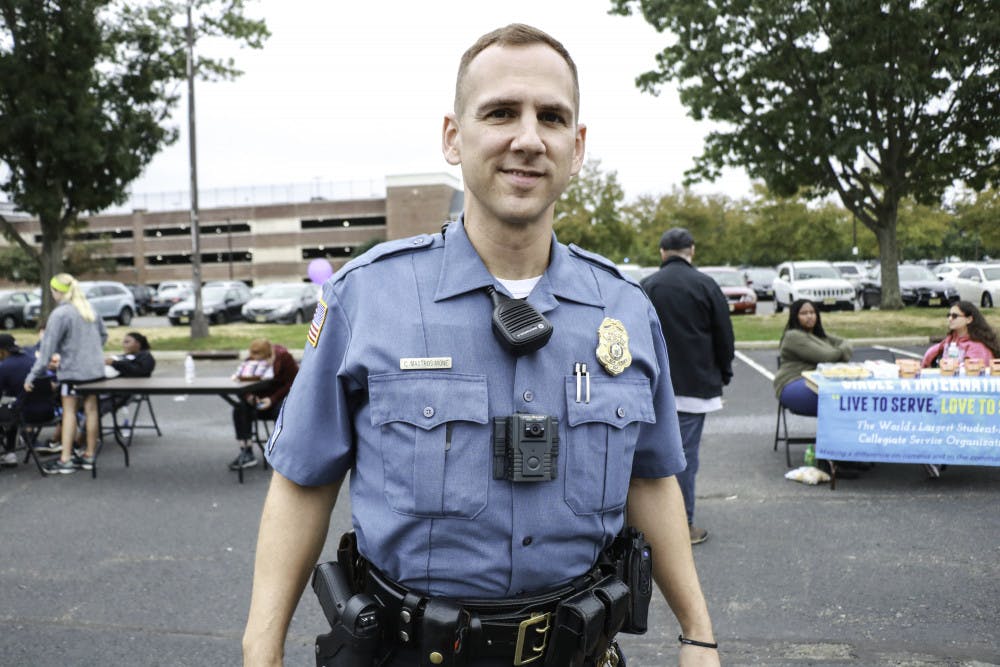By Nicole Viviano
Correspondent
After being awarded a federal grant this summer, Campus Police finished equipping its officers with body-worn cameras at the start of October.
Campus Police began the discussion and application process to meet all U.S. Department of Justice criteria nearly two years ago.
From the moment an officer receives their shift briefing, their cameras are fastened on the center of their chest. The cameras are worn throughout their shift, however are not constantly recording.
The devices are triggered automatically during certain situations, such as when an officer turns his or her police lights on, or if he or she is at a scene where another officer’s device is activated.
Dash-cams on vehicles and body-worn cameras are synchronized while on duty. For instance, both would be activated when an officer’s car lights are turned on. The technology organizes the video taken per officer and per case.
In the event of a second officer arriving at a scene where the first officer’s camera is activated, any video taken by the second officer will be filed in the same case as the first officer’s recordings.

According to Police Captain Tim Grant, body-worn cameras are both a safety and training instrument for officers. Grant explained that the body-worn cameras will allow officers to review encounters with the public through archived video, which creates an opportunity for learning and improvement for officers and the department’s administration.
Campus Police officers received training on how to use the body-worn cameras prior to implementation, and continue to learn on the job.
According to Campus Police Lt. James Lopez, officers are understanding the device’s basic operations and learning to be more conscious of its presence while they are responding to calls. Lopez hopes that with rigorous training the College’s officers will achieve the device’s fullest potential.
Lopez believes that the cameras will provide Campus Police with a new learning mechanism and a method of self evaluation.
“When you play it back you actually get to see factual information for when you write your report,” Lopez said.
Lori Thompson, director of strategic initiatives and program development in the College’s Office of Grants and Sponsored Research, acted as the grant writer for Campus Police. She spearheaded the process for the $43,000 federal grant, issued by the U.S. Department of Justice.
The College of New Jersey Campus Police Services Body-Worn Camera Policy and Implementation Program grant was accomplished through the dedication and collaboration of the College’s Campus Police and OGSR.
“She worked side by side with us in getting all the technical parts of the grant down,” Grant said.
The goal of the federal grant was to “support the implementation of body-worn camera programs in law enforcement agencies across the country,” as described by the U.S. Department of Justice’s Bureau of Justice Assistance.
The funding is intended to aide in the development, implementation and evaluation of a BWC program, to be used “as one tool in a law enforcement agency’s comprehensive problem solving approach to enhance officer safety and build community trust.”
Campus Police is currently working to iron out privacy issues and other complications that specifically pertain to a college campus. Informing the public was one of many conditions required of the federal grant, upheld by the 2016 New Jersey Attorney General Law Enforcement Directive, that the Campus Police has met.
“We want the community to know that our officers are wearing cameras,” Grant said.
According to Bill Straniero, associate director of campus security, body-worn cameras will provide Campus Police with more transparency and accountability when reviewing incidents. Instead of just relying on personal accounts, Campus Police can use footage to efficiently judge and resolve complaints.
“It’s an equal playing field for everyone,” Straniero said. ‘There are no longer questions of he said she said, but instead the ability to call up specific encounters for review. The devices allow for complaints to be handled immediately and accurately.”
Campus Police uses WatchGuard for its body-worn cameras, the same brand currently used for the department’s dash-cams. This allows for seamless downloads and organization of video from each individually assigned body-worn camera and dash-cam.
Device deactivation can be requested of a responding officer by civilians. The request must be clearly and verbally stated on the recording once a decision is made whether or not to comply. The officer will determine whether it’s appropriate to deactivate the device, taking into consideration the safety of everyone involved. If the officer deactivates the device, he or she is required to inform a sergeant, once the situation has been addressed.
Transparency is of great importance to the Campus Police. Straniero stated that he encourages students to feel comfortable approaching Campus Police to ask questions about the device. He stated that his officers would be happy to speak and interact with any student.
“I think it enhances the perception of (officers’) professionalism,” Grant said.
Grant and Straniero presented a PowerPoint to the College’s Staff Senate and Student Government prior to implementing the body-worn cameras. Campus Police also consulted its own officers, community groups and the Mercer County Prosecutor’s Office.
As per the New Jersey Attorney General Law Enforcement Directive, Campus Police posted pictures of the body-worn camera and an officer wearing it on the College’s website.







